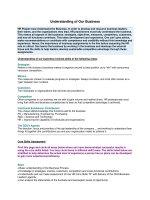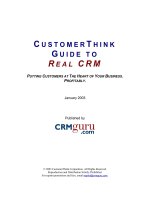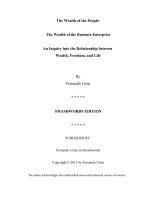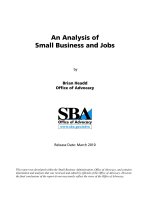Understanding of Our Business
Bạn đang xem bản rút gọn của tài liệu. Xem và tải ngay bản đầy đủ của tài liệu tại đây (92.83 KB, 2 trang )
Understanding of Our Business
HR People must Understand the Business. In order to develop and resource business leaders,
their teams, and the organizations they lead, HR practitioners must fully understand the business.
This means all aspects of the business; strategies, objectives, measures, competitors, customers,
and how all functions contribute. This takes development and experience. One can't give advice,
make recommendations or contribute with competence and credibility without this knowledge and
experience. Hence, the importance of business assignments in the line before assuming the HR
role is critical. One learns the business by working in the business and develops the external
focus and the skills to help leaders develop sustainable competitive advantage through these
assignments.
Understanding of our business involves skills in the following areas:
Strategies
Refers to the choices a business makes to organize around to best position us to "win" with consumers
versusour competitors.
Metrics
The measures chosen to evaluate progress on strategies. Always numbers, and most often shown as a
"gap" between two numbers.
Customers
The individuals or organizations that services are provided for.
Competition
Other companies in our business we vie with to gain volume and market share. HR professionals must
bring their skills and business competencies to bear so that competitive advantage is achieved.
Functional Excellence/ Contribution
The unique skills/knowledge that functions add to the business
PS = Manufacturing, Engineering, Purchasing
R&D = Science and Technology
HR = Improving the capability of individuals and organizations
The CEO's Agenda
The direction, focus and priorities of the top leadership of the company.....and working to understand how
things fit together (the contributions you and your organization make) to achieve it.
Core Skills Assessment
Print this page and circle all areas below where you have demonstrated successful results in
using the core skills listed. You may circle items in different skill levels. The skills listed below are
stratified to help determine the actual level of experience a person has so plans can be developed
to gain more experience/proficiency.
Basic
• Basic understanding of the Business Process
• Knowledge of strategies, metrics, customers, competitors and cross-functional contributions
• Understands and can make assessment of how HR Core Skills "fit" with delivery of the CEO/Business
Leaders' agenda.
• Can analyze the status/state of the business and see/explain areas of opportunity.
• Able to lead discussions about the business.
Advanced
• Solid understanding of the business, the key consumers and the positioning and "state" of the
competitive set.
• Called upon to make suggestions for interventions to improve results based on analysis of the business.
• Able to evaluate the cause and effect of our interventions and anticipatively offer counter measures to
improve results.
• Takes the lead in partnering with BU LT to educate/train the organization on our strategies and
interventions.
Master
• Called upon to solve strategic business problems and suggest interventions to improve results.
• Make effective recommendations on how to make changes in linking culture with strategy to improve
results.
• Capable of leading the BULT in the analysis of results and guiding them to clear, focused action plans.
• Used as the Master developer of those training to lead the HR role in the business.









